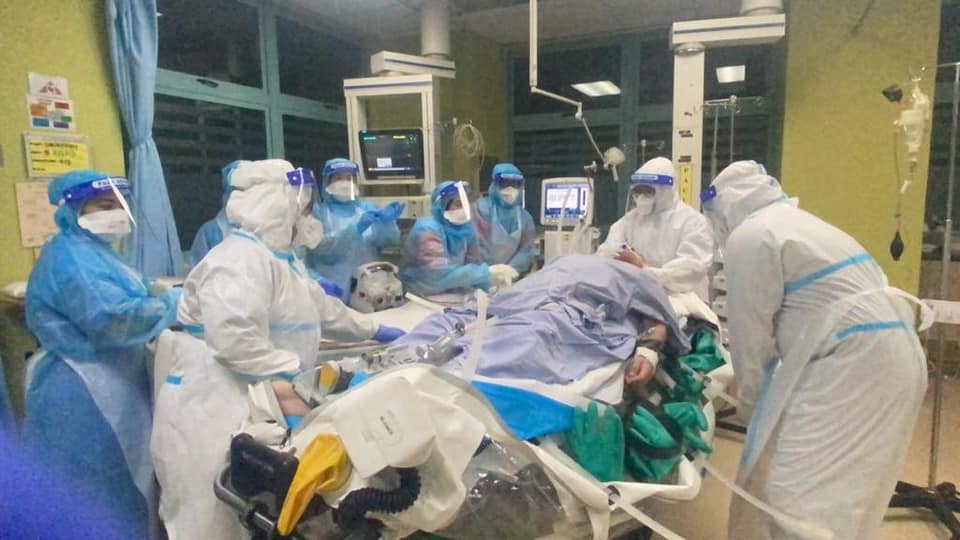KUALA LUMPUR, Jan 20 – Covid-19 tests should be reserved for cases with symptoms to enable early diagnosis and treatment for sick patients, public health expert Prof Dr Lokman Hakim Sulaiman said.
According to Dr Lokman, as the country moves towards an endemic Covid-19 state, a sudden surge of infections may result from coronavirus variants that can better overcome protection from vaccines.
In this scenario, the country would not be able to contain Covid-19 cases, but should instead detect severely ill Covid-19 patients to avoid burdening the health care system.
“It is very apparent that with regards to Covid, we no longer talk about protection from infection but protection from severe disease. So as long as it does not cause severe disease, then we should not be worried,” Dr Lokman told CodeBlue.
“In this context, screening for asymptomatic infection is no longer relevant.”
Last week, the Indian Council of Medical Research (ICMR) announced that people without Covid-19 symptoms are not required to do a test before undergoing any surgeries, including pregnant women unless they develop symptoms later. Only high-risk groups of patients, such as elderly people and those with underlying medical conditions, are required to do Covid-19 tests even if they do not possess any symptoms.
Similarly, some other countries like the United States, France and the Philippines have also recommended Covid-19 tests only for people who display symptoms to ramp up testing capacities and to identify sick patients, as breaking the chain of transmission during a surge of infections is no longer the priority.
Dr Lokman, who is the pro vice chancellor of research at the International Medical University (IMU), pointed out that major events like the Melaka and Sarawak state election last year, as well as the resumption of interstate travel, did not contribute to a rise in Covid-19 cases due to high vaccine coverage in the country. Nearly 80 per cent of Malaysia’s total population is fully vaccinated.
“The reality is Covid-19 will never disappear from this world. With high vaccination coverage, the transmission should be under control and manageable and we will come to an endemic state.”
Prof Dr Lokman Hakim Sulaiman, pro vice chancellor of research, International Medical University
He noted that genomic surveillance to detect the new contagious Omicron variant must be the top priority of the Ministry of Health (MOH) as the new variants pose a high risk of new and breakthrough infections.
“We must do enough sampling for genomic surveillance to ensure we are able to pick up the new variant and assess its impact.”
According to the global GISAID database, Malaysia has only shared 2,025 genome sequences of coronavirus variants in the last 90 days as of January 15, or 0.48 per cent of 421,884 reported Covid-19 cases.
At the same time, Dr Lokman does not support the frequent administration of Covid-19 vaccine booster shots without strong evidence that initial vaccination is ineffective against infection or severe disease.
“In my opinion, the decision for further booster doses because of waning immunological parameters – from a small fraction of the population – must be corroborated with epidemiological evidence that the vaccine and other public health measures are no longer working. We cannot be boosted after every few months.”
Experts from the World Health Organization (WHO) said last week that a vaccination strategy of repeated booster doses of existing vaccines against new coronavirus variants is not an effective way to deal with the pandemic.
Be Ready To Embrace Covid Surge, Learn From Past Experiences

Malaysia should get ready to embrace a potential surge of Covid-19 cases caused by the highly infectious Omicron variant, although it may be less severe than the Delta strain, Dr Lokman said.
Based on preliminary data on the impact of Omicron in Malaysia, he agreed that the presence of the strain might not be as severe as the previous Covid-19 outbreak caused by the Delta variant.
However, Dr Lokman cautioned the Ministry of Health (MOH) to take early precautionary measures to keep future Covid-19 outbreaks under control.
He said a spike in Covid-19 cases can be a huge burden to the health care system, especially when MOH is still struggling to cope with a backlog of non-Covid surgeries.
Health Minister Khairy Jamaluddin said in his New Year message to MOH staff last Thursday that the over 50,000 backlogged surgical and medical-based procedures in MOH hospitals must be resolved this year.
Dr Lokman also stressed that MOH’s early intervention measures to enhance the country’s health care capacities are vital to prevent the health system from being shattered by a rapid rise of Covid-19 cases.
“If this is the reality, the virus continues to mutate and breakthrough infection continues to occur, then we must be prepared for sudden surge of cases by increasing the capacities of our health care systems at all levels – from preventive, promotive to primary, secondary, and tertiary care levels and in all disciplines – surveillance, diagnostic, investigation, quarantine, curative etc.”
He recalled how in the past, the Covid-19 case notification and investigation system failed and led to the collapse of the entire health care system in the Klang Valley when the country was battling with Covid-19 cases in the third and fourth quarters of 2021.
“Have we got a more robust and responsive notification system up and running? If we haven’t, I think we never want to learn from our experiences.
“Similarly with intensive care unit capacity, we knew even before Covid that our ICU (intensive care unit) capacity is inadequate for the needs of the country. So have we got a long-term solution to the problem? While waiting for that, I believe our experience in managing the previous surge should come handy to manage new surges.”
People With Underlying Health Conditions Can Become Sick Covid-19 Patients

Consultant pediatrician Dr Musa Mohd Nordin, who also concurred with Dr Lokman, said Omicron can be less severe than the earlier variants. Nevertheless, he warned that there are chances for patients with other diseases becoming ill due to Covid-19.
“The United States and Europe are seeing record numbers of Covid patients, mostly due to the Omicron variant. Unlike the earlier waves, the Covid patients are somewhat less sick, suggesting that the Omicron variant is very contagious but milder in causing disease severity,” Dr Musa told CodeBlue.
Although Malaysia has reported nearly 1,500 Omicron cases as of January 6, including presumptive Omicron infections, the national Covid-19 case trend remains at a plateau, with a seven-day average of 3,169 daily cases on January 14.
Dr Musa highlighted that sick Covid-19 patients who require oxygen support consist of unvaccinated individuals or those with underlying health conditions like non-communicable diseases, saying: “For example a diabetic patient may be triggered into ketoacidosis, a serious condition requiring hospital care.”
“The unvaccinated make up the majority of the sickest Covid patients requiring oxygen and respiratory care in the ICUs. The others are those who are only partially vaccinated and un-boosted patients.”
Dr Musa Mohd Nordin, consultant paediatrician
Dr Musa noted that Malaysia should be prepared to embrace a sharp rise in Covid-19 cases due to Omicron.
“Malaysia must brace for this possible eventuality. Unlike previously, we now have good vaccines and they are our best option to keep people out of our hospitals and not overwhelm our health care services like previously.”
At the same time, he emphasised the need to protect health care providers from being infected with Covid-19 as they are the backbone of the country’s health care system.
He said Malaysia should practice multi-agency or multi-sectoral engagements to implement inclusive and coordinated initiatives, especially forming automated pandemic management systems to curb a rapid outbreak in the near future.
“It is important that our health care providers are all boosted with mRNA vaccines to ensure that we are not short-staffed when Omicron hits us.”
Vaccination And SOP Compliance

When asked about the effects of Omicron, consultant paediatrician and paediatric cardiologist Dr Zulkifli Ismail noted that it is a process of natural selection for the Covid-19 virus to evolve into a less virulent but easily transmissible variant to continue to survive.
“Concomitant comorbidities will contribute to higher hospitalisation but the high vaccination rates prioritising the aged and those with NCDs will help to dampen this,” Dr Zulkifli told CodeBlue.
Dr Zulkifli added that the current Covid-19 vaccines should be able to suppress severe cases, hospitalisations and ICU care.
He said compliance with precautionary measures, including standard operating procedures (SOPs), is the key to curb any potential surge of outbreaks caused by Omicron.
“We cannot expect zero admissions or deaths yet though. I think it will take a year or two more before this natural attenuation process is complete, going by the experience of the 1918 influenza pandemic that took three years to settle with wave after wave of deaths when people forget to follow the SOPs, mainly in the bigger US cities.”








